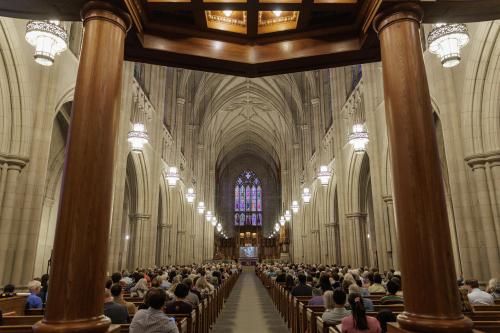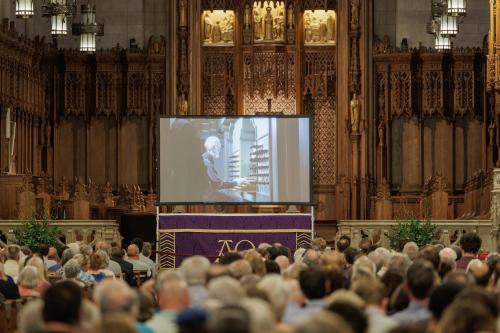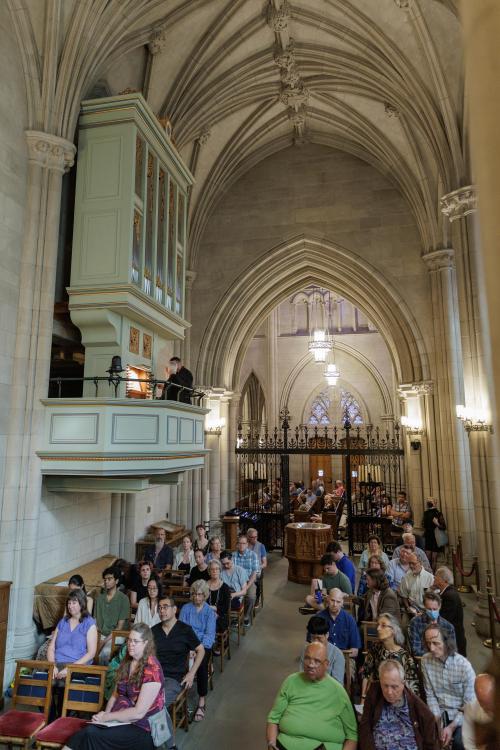
Robert Parkins Honored with Naming of a Duke Chapel Organ
On April 6, 2025, University Organist Dr. Robert Parkins presented his farewell recital in Duke Chapel before an audience that filled the Chapel’s pews with hundreds more watching online. He performed on all three of the Chapel’s main organs, selecting pieces he had previously played at dedicatory recitals for each of those instruments during his forty-seven years at Duke.

After playing the final note on a rousing rendition of Eugène Gigout’s Toccata, Dr. Parkins stepped out from behind the console of the Kathleen Upton Byrns McClendon Organ (Aeolian) and was met with a standing ovation lasting several minutes. (Watch a recording of the recital, read the concert program, and listen to a podcast interview.)
A further honor awaited Parkins at a reception following the recital. Chapel Dean Luke Powery announced that the Brombaugh Organ, located in Memorial Chapel inside of Duke Chapel, had been named the “Robert Collings Parkins Organ.”
“Bob has performed dedicatory recitals on all three of the Chapel's primary organs in three different decades, and he oversaw the installation of the Brombaugh organ in Memorial Chapel in 1997,” Dean Powery said in a video message played at the reception. “So, Bob, in recognition of your forty-seven years of service to Duke and Duke Chapel, in gratitude for the legacy of sacred music you leave behind, and with the consent of Duke University President Vincent Price, it is my pleasure to announce that the Brombaugh organ in the Memorial Chapel has been named in your honor.”
The honor comes as Parkins is set to retire from Duke this summer. He first came to the university in 1975 to serve as Chapel Organist at Duke Chapel and also joined the faculty of the Department of Music, where he is currently a Professor of the Practice of Music. He left Duke in 1982 to take a faculty position at Ithaca College in New York but returned to Duke three years later. In 1990, he was appointed University Organist.
In his thirty-five years as University Organist, Parkins has played thousands of hymns and voluntaries for Chapel services and university events, and he has also directed the annual Organ Recital Series. In the Department of Music, he has taught primarily organ, harpsichord, and music theory. He has also served as Director of Undergraduate Studies and Director of Performance.

As a performer, Parkins has presented recitals throughout the United States and Western Europe as well as in Central America, and he has recorded albums for several classical labels—such as Calcante, Gothic, Loft, Musical Heritage Society, and Naxos. As a scholar, he has published academic articles in journals including The Organ Yearbook, Early Music, The American Organist, and The Diapason, as well as a chapter on Spain and Portugal in Keyboard Music Before 1700.
Chapel Music Director Dr. Zebulon Highben and Dr. Verena Mösenbichler-Bryant, chair of the Music Department, gave a joint introduction to Parkins’s recital.
“Whether interpreting the works of Brahms, Frescobaldi, or the great Iberian and south German composers, Dr. Parkins has enriched the organ world with a voice both authoritative and expressive,” Dr. Highben said.
“From his writings on early Iberian keyboard performance practices to his chapter on Spanish and Portuguese keyboard music in Keyboard Music Before 1700, Dr. Parkins has left an indelible mark, not just as a performer, but as a scholar whose insights will continue to shape the study of keyboard music,” Dr. Mösenbichler-Bryant said.

One reason the organ in Memorial Chapel was named in Parkins’s honor is that he was heavily involved in guiding its installation in 1997. The idea for another organ in the side chapel had been floating around since Parkins had returned to Duke in 1985, but it wasn’t until he became University Organist in 1990 that he began discussing with organ builder John Brombaugh the concept of a new organ crafted to play pre-eighteenth century music.
“We already had the Flentrop, we've got the Aeolian, and so we've got a lot of bases covered already in terms of music history for the last three or four hundred years,” Parkins explained in an interview about the organ’s origin. “We both got on the idea of an Italianate instrument.”
“John was very keen on this, and so was I because I deal with Iberian music and south German, Italian, Portuguese, [and] Spanish [keyboard literature],” he said. “And so we came up with an idea for an Italianate organ that would be expanded a bit.”

The new instrument used a historically appropriate tuning system for playing sixteenth- and seventeenth-century music called "quarter-comma meantone temperament." It also included a second keyboard-pedal set, not usually found on Italian organs of that era, which extended its capacity to play a wider range of organ music as well as hymns.
“It was one of very few meantone instruments in this country, and I still think that's the case,” Parkins said. “What [meantone temperament] does is it makes the consonances so beautiful and the dissonances so dramatic, and it brings all that kind of [early music] literature out into bold relief.”
As part of the announcement naming the Robert Collings Parkins Organ, Powery said Parkins embodied the university’s historic motto of Eruditio et Religio (Education and Religion).
“You bridged teaching and learning with faith and service, the academic mission of Duke with its spiritual mission, and you did it so faithfully,” Powery said. “You are actually in the long line of those in the tradition of Johann Sebastian Bach, who played and created music Soli Deo Gloria —for God's glory alone.”
When asked what he will miss most in his retirement, Parkins said it will be the Chapel’s organs, even coming in late on Friday and Saturday evenings to rehearse. “Being able to practice in here, when the Chapel is locked up—it's quiet and it's all at my disposal—that's a blessing,” he said. “It really is.”
Parkins will play in his final Chapel Sunday morning service as University Organist on April 27 at 11:00 a.m. and his final Baccalaureate services on May 9.